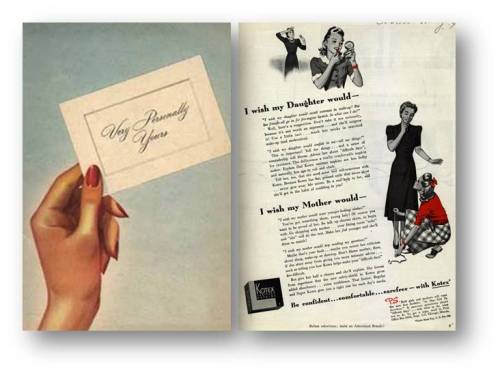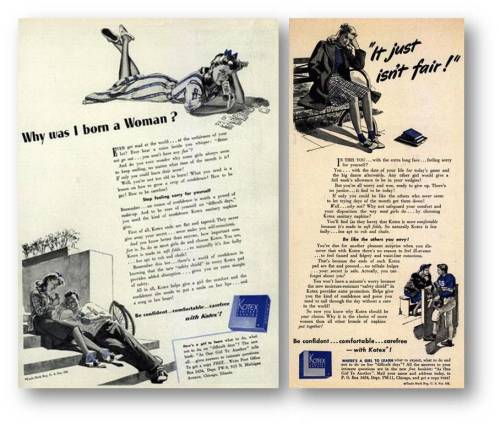However, this cultural taboo gradually diminished in the 1940s with publication of puberty and menstruating booklets. Kotex came up with small booklets, to educate young girls undergoing puberty about the changes in their body and how to deal with it and everything they needed to know about how to use a sanitary napkin. They titled it ‘very personally yours’ which gives woman a more intimate and personalized feel. The publication of these booklets thus opened up channels for discussion about women having their periods, making it more widely discussed and thus not so much a taboo topic anymore. In addition, these booklets were also aimed to improve relationships between a mother and daughter as they encourage mothers to give their daughters these to help them understand why their body is undergoing massive changes. Hence, the puberty and menstruating booklets provided an avenue not only for mothers and daughters to communicate better; it also enabled sanitary napkins to be more widely talked about in society.
The usage of sanitary napkins to foster better relationships between mother and daughter was also evident in one of the Kotex advertisements in the 1940s. The advertisement is segmented into two parts, one focusing on the thoughts of a mother who wishes that her daughter would ‘avoid extremes in makeup’ but is unsure of how to help her daughter feel better about herself. Kotex thus offers the solution for mothers to tell their daughters to use Kotex ‘because Kotex has flat, pressed ends that never show…never give away her secret’. In another part of the advertisement, it shows a girl wishing that her mother would be more fashionable, and the advert encourages young girls to give their mothers a chance to share their experience about ‘difficult days’ during their period. Hence, the advertisement was aimed at not only advertising the sanitary napkins, but also in helping with the family movement to foster better ties between mother and daughter.
Kotex sanitary pads were also a tool in helping woman to feel more confident about themselves and thus aided in the rise of woman power in the working world. America entered World War II for the very first time in 1942, after the bombing of Pearl Habour. As a result, men were forced to leave behind their jobs and fight for the country. In view of this, women stepped up to replace them, entering the working world for the very first time. As it was their virgin experience in the workforce, women were naturally not very confident of themselves in carrying out what used to men’s tasks. Kotex ads thus used the notion of building self confidence in women as a selling point, for their sanitary pads. In one of the Kotex ads in the 1940s, the opening line was ‘Why was I born a woman?’ and a girl was shown feeling perplexed and angry over the fact that because she is a girl she has to have her period and thus deprived of going out and have fun. Following this, the advertisement tells consumers ‘Stop feeling sorry for yourself!’ and ‘to be sure on difficult days, you need the kind of confidence Kotex sanitary napkins give’. Kotex thus provides women with a solution to feeling insecure and uncomfortable on their period days, allowing women to function better at work. At the same time, through feeling comfortable, women will be able to carry out their tasks at work with more self confidence of their actions, contributing to the rise in woman power in the working world over the years. Hence, because of the war women were given the opportunity to get out to work and this shaped the way Kotex advertised for their sanitary napkins. They played on building self confidence as a catch for women to buy their products.


